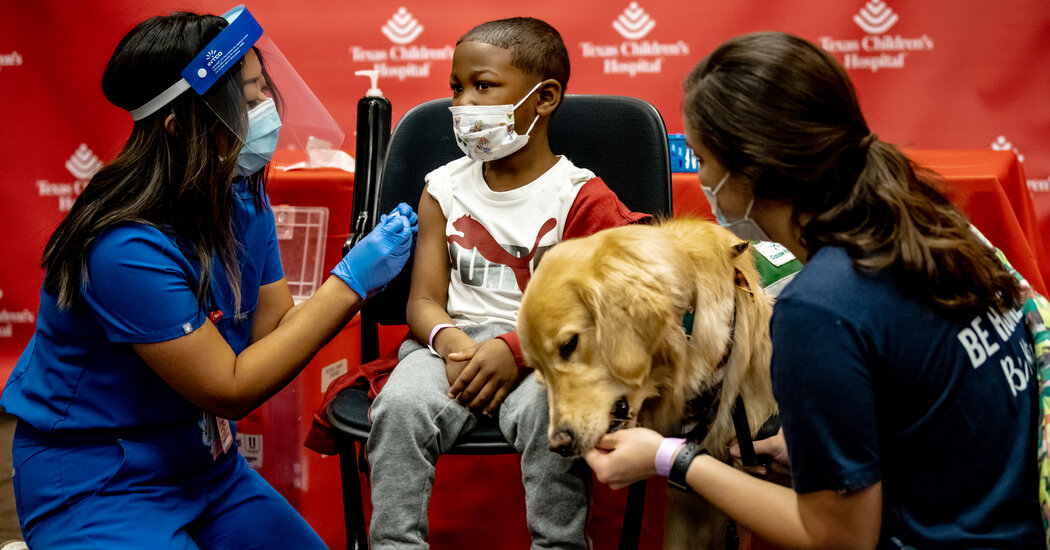

Albert Bourla, Pfizer’s chairman and chief executive, said in a statement that “ultimately, we believe that three doses of the vaccine will be needed for children 6 months through 4 years of age to achieve high levels of protection against current and potential future variants.” But he said that if two doses are authorized in the meantime, “parents will have the opportunity to begin a Covid-19 vaccination series for their children while awaiting potential authorization of a third dose.”
Pfizer and BioNTech’s study of younger children was intended to measure immune responses, not the vaccine’s efficacy in preventing infections or severe cases of Covid-19. But because some children in the trial became infected, researchers got indications of how well the vaccine worked to stave off the virus, two people familiar with the study said. A similar development occurred in the companies’ study of their vaccine in 5- to 11-year-olds, which overlapped with a crushing wave of the Delta variant.
One person familiar with the data, who spoke on condition of anonymity, said children 2 to 4 years old who were given two shots were infected at a rate 57 percent lower than the children in the placebo group. Children 6 months to 2 years old who got shots were infected at a rate 50 percent lower than the placebo group. There were fewer than 100 cases of symptomatic infection — a small fraction of the participants overall — and the margins of error were wide, that person said.
The data also suggested that the vaccine better protected the children against infection from Delta than from Omicron. Omicron is better than Delta at evading the protection of both the Pfizer-BioNTech and Moderna vaccines in adults.
The regulators’ strategy seemed based in part on the likelihood that the Pfizer-BioNTech’s three-dose trial would prove successful. Several experts, including Dr. Yvonne Maldonado, a Stanford professor of pediatric infectious diseases, said the history of vaccines suggested that a third dose would, in fact, enhance the immune response.
“There’s almost no conceivable hypothesis where a third dose would be worse,” said Dr. Maldonado, a lead investigator at the Stanford site of Pfizer-BioNTech’s pediatric vaccine trials. “At worst it could be no different. So it might just be that two doses is the best you’re going to get.”
Dr. H. Cody Meissner, another member of the F.D.A. advisory committee and chief of the pediatric infectious diseases division at Tufts Children’s Hospital, said he was open minded about the F.D.A.’s approach. But he said he worried about whether rare side effects might be missed in small-scale trials. The Pfizer-BioNTech trial included about 1,200 children younger than 2, and about 1,500 between 2 and 4, according to people familiar with the study’s design.
24World Media does not take any responsibility of the information you see on this page. The content this page contains is from independent third-party content provider. If you have any concerns regarding the content, please free to write us here: contact@24worldmedia.com

Common Mistakes When Using Athletic Field Tarps

High-Performance Diesel Truck Upgrades You Should Consider

Warehouse Optimization Tips To Improve Performance

Fire Hazards in Daily Life: The Most Common Ignition Sources

Yellowstone’s Wolves: A Debate Over Their Role in the Park’s Ecosystem

Earth Day 2024: A Look at 3 Places Adapting Quickly to Fight Climate Change

Millions of Girls in Africa Will Miss HPV Shots After Merck Production Problem

This Lava Tube in Saudi Arabia Has Been a Human Refuge for 7,000 Years

Four Wild Ways to Save the Koala (That Just Might Work)

National Academy Asks Court to Strip Sackler Name From Endowment

Ways Industrial Copper Helps Energy Production

The Ins and Out of Industrial Conveyor Belts